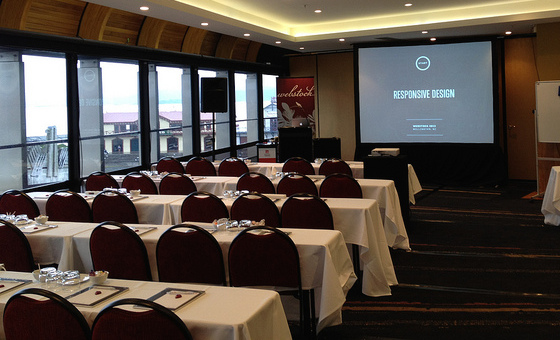 They say that speaking in front of a group of people is one of the most dreaded things that we could be called on to do. So please don’t get mad with what I am about to say. But that has never bothered me. In fact, it energizes me.
They say that speaking in front of a group of people is one of the most dreaded things that we could be called on to do. So please don’t get mad with what I am about to say. But that has never bothered me. In fact, it energizes me.
I was involved in theater for many years and I owned a speakers bureau and was a professional speaker for a time many years ago. And one of the questions that was asked of me during those years was this:
How do I get better at being “on stage” or at speaking to a group of people?
And here was my answer: Practice, practice, practice!
What is the implication for you as a leader?
It is that there is almost always some part of the role of leader that will involve standing up in front of your team and speaking to them in a public forum. The occasion may be to share great news of a great success. Or it may be to deliver the news that something terrible has happened and you will need to break the news to the team. Whatever the circumstance, you will need to have an upfront role in leadership.
There is no need to panic. Here are some things that will help this common angst!
Talk to yourself — Yes, that’s right, talk out loud like a nut case! These days you can get away with it because people will simply think you’re on your smart phone Bluetooth headset. What a great time to be living!
Here’s how I use this method: I ask myself key questions that I know I will face during the day. For example, someone might ask me how my book is coming and I spend a few moments going over what I might say on that subject. I answer myself out loud because it helps to lock in the content. We have a steady dialog running through our heads, but while doing so, we go down every rabbit trail available. When we speak out loud we tend to stay more focused. Practice speaking out loud to yourself.
Talk to others in conversations — If you want to turn that steady dialog in your head into something presentable, start by giving succinct and cogent answers and statements in your conversations with others. Don’t mumble. Rather speak your thoughts clearly and convincingly. It will make you a far more secure upfront presence!
Watch others who are good at it — Have you seen the Ted Talks on YouTube? They are short, to the point being addressed, and extremely well prepared and rehearsed. In a couple of hours of observing them, you can have the equivalent of a really good speech coaching session. In terms of information on “How To” communicate, this is better than Toastmasters.
There are other places to turn for observation of public speaking skills. Tune in to some of the big name preachers on TV. Some of these guys are master communicators. And if you want to watch some really quick exchanges in public, try to tune in to the Prime Minister’s Questions in the British House of Parliament. This is theater at its finest!
Move around – Many of us were taught to “stand still” while speaking. This can be deadly to a many kinds of presentations. One of the least practiced drills is moving around the stage or platform—not staying fixed on a single position, but rather, using larger areas to tell your story. In the theater we call this blocking. Blocking refers to the movements of the actors on stage while delivering their lines.
Find a location on the stage or platform and use that as the point from which you deliver the key points. Your audience will quickly learn and anticipate what you will say when you move to that location.
A static position yields “static listening.” Even the most passive listeners react physically to sudden motions in front of them. That’s one of the other reasons that we jam on the brakes and stop when someone cuts in front of us in traffic. The same applies to your time on stage…you move, they react!
Pause for effect — Pause and take a long breath every once in a while. It will be good for you and your audience. When having a personal conversation with people, practice “pausing for effect.” That is, STOP, take a breath, check to see if they’re listening, and then proceed. Sometimes being quiet is more powerful than talking!
We all know “natural” speakers. But are they really natural? Or are they just really polished and practiced? If you were to ask these folks how they do it, they would probably tell you that they practice extremely hard in private to do what we perceive to be totally natural in public
Now here is a leadership lesson for all of us. — Natural ability only goes so far!
Question: What are you doing to boost your speaking skills? You can leave a comment by clicking here.
Photo credit: Andrew E. Larsen / Foter / CC BY-ND
Photo credit: Beep. / Foter / CC BY-NC-SA




Please note: I reserve the right to delete comments that are offensive or off-topic.